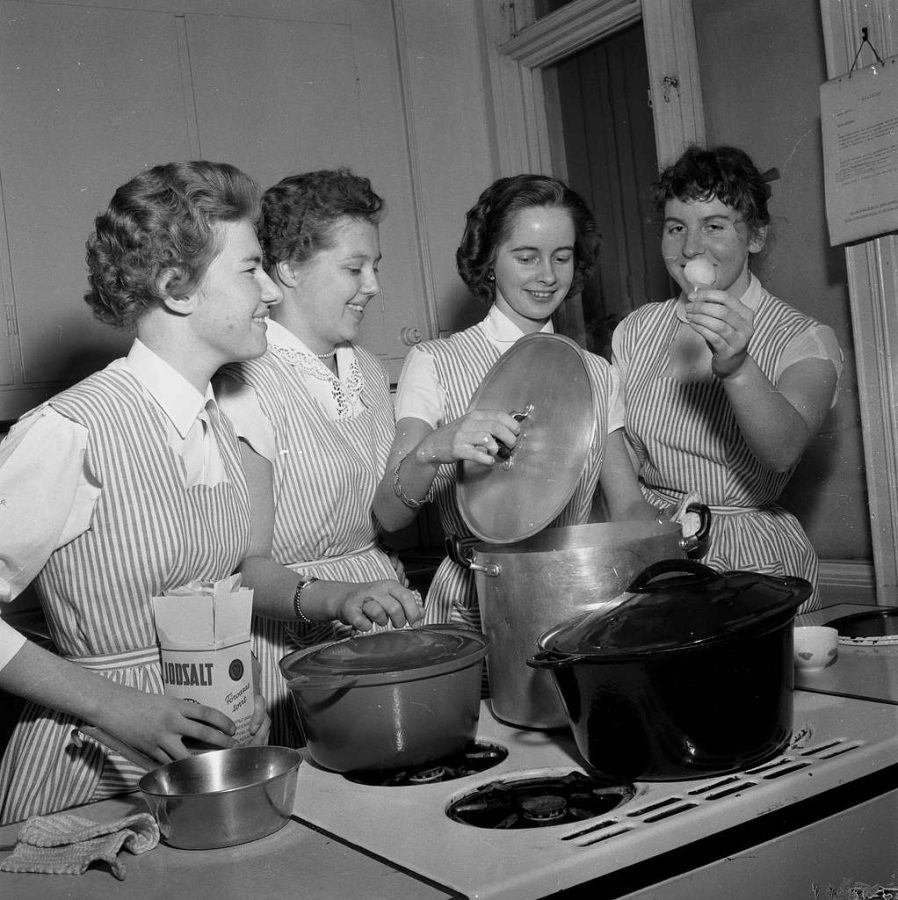Opinion: FSS Curriculum Suffers from Lack of Home Economics Course
My final years of high school revolved heavily around test scores, college essays, extracurriculars, and grade point averages. I’ve been told that it’s all been preparation to start college and subsequently, life on my own. However, not once have I been told how to make a grocery list, budget for the month, or fix a sink. This has led me to believe that FSS should offer a practical-skills elective that educates students on financial management, culinary skills, and basic home repair and sewing abilities.
While “Home-Ec” may bring to mind vintage photographs, like the one above, of young women training to become housewives and mothers, modern home economics courses cover a wider range of life skills and are beneficial to students of all genders and career interests. In fact, the term “home economics” was mostly eradicated by 1994, with schools opting for the name “Family and Consumer Science Course (FSC)” to combat the notion that its sole focus was on female domestic work. In my opinion, that isn’t quite the right term either because most of those skills aren’t/shouldn’t only be applicable to students who plan to have families; however, I will use the term’s abbreviation for the sake of concision.
Introducing a modernized domestic skills class to students may help fight gender roles and inequalities. An FSC would help to dismantle gender roles by teaching boys/men “domestic” work, often reserved for the upbringing of girls/women. Whether through observing their parents or expectations in school, stewardship of physical space is often practiced more heavily by non-male presenting people and continues into adulthood. According to Pew Research Center, “A majority of women (59%) say they do more household chores than their spouse or partner.” FSCs would hopefully help to familiarize everyone with common household skills, as well as encourage self-reflection on how individual students care for themselves and others.
Additionally, modern home-ec classes aren’t limited to stereotypical “domestic work” but, according to NPR, can and should include topics such as, “personal finance, healthy relationships, how to balance work and home responsibility, and child development.” These topics can be applicable to almost everybody, regardless of living situation, career choice, or economic status.
FSC’s teach important life skills that many recent high-school graduates lack, such as budgeting, savings, making basic household repairs, cooking, and mending clothes. As prices increase and food/material waste becomes a massive problem, knowing the basics of how to cook, grocery shop, or sew on a button could be necessary. According to UMich, “Only fifteen percent of adults say they learned to cook in classes or in school.” And as ordering takeout through services like Doordash or UberEats skyrockets in popularity, many sacrifice their health and finances. The average household in America spends $3,000 a year dining out, with people under 25 having the highest share of their spending on food away from home. Furthermore, studies have shown that regularly cooking at home often correlates to maintaining a healthier diet. Managing spending and maintaining health can tie back to the ability to cook a basic meal.
An FSC class at FSS would also open more possibilities for collaboration between teachers and respective departments. As FSS has been eager to brand the STEAM building as a representation of the relationship between the arts and sciences, a practical skills class could create further intersection between departments. Hayden Pastor ‘23 is a student of many interests and an enthusiast of science and art, taking classes ranging from metalsmithing to engineering. He notes, “Cooking is dynamic: universally applied while touching on many different educational domains. It is a lesson in chemistry, biology, history, and even art. I believe a home-ec class could act as a catalyst to create great ties between the humanities, science, and art departments in the high school.” With topics ranging from how to balance a checkbook to fixing a chair to baking a cake, FSC’s would require competency in many subject matters.
As a college preparatory school, FSS should be preparing students for all aspects of independent living. However, our curriculum lacks a practical-skills class that will prepare students in how to take care of themselves and their living spaces after graduation. With this cross-department effort, I believe we can deepen Friend Select’s educational experience and uphold our values of community, equality, and stewardship.




























